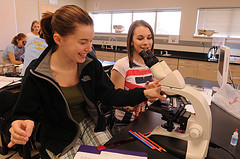Biology students at Gonzaga get the valuable opportunity to participate in research with faculty. The faculty include students in their research because they are always excited when a student makes a new discovery in their labs, and they are convinced that doing research is a great way to learn science.
As a testament to their dedication to undergraduate research, the Biology and Chemistry Departments were awarded a major grant ($1.2 million) by the Howard Hughes Medical Institute to support science education and research. Gonzaga is one of only 48 undergraduate institutions to be awarded this recognition. The four year grant, which started Fall 2008, allows Gonzaga to offer more research positions for undergraduates both during the academic year and the summer, hire additional faculty, develop new courses, and expand the science-education outreach program. Students can join in the research during the school year and summer. Some students become co-authors with their faculty mentors, publishing papers in scientific journals and presenting posters at regional and scientific meetings.
Some current research projects are:
How does cell adhesion relate to colon cancer?
How did cocaine synthesis evolve in plants?
Can lady beetles be used in place of pesticides?
What does calcium do in photosynthesis?
How does an extra chromosome affect a cell?
How do social woodpeckers choose mates?
Click here to read a summary of each of these research projects on our Gonzaga website.
HHMI is the nation’s largest private supporter of science education. It has invested more than $1.6 billion in grants to reinvigorate life science education at both research universities and liberal arts colleges and to engage the nation’s leading scientists in teaching.
